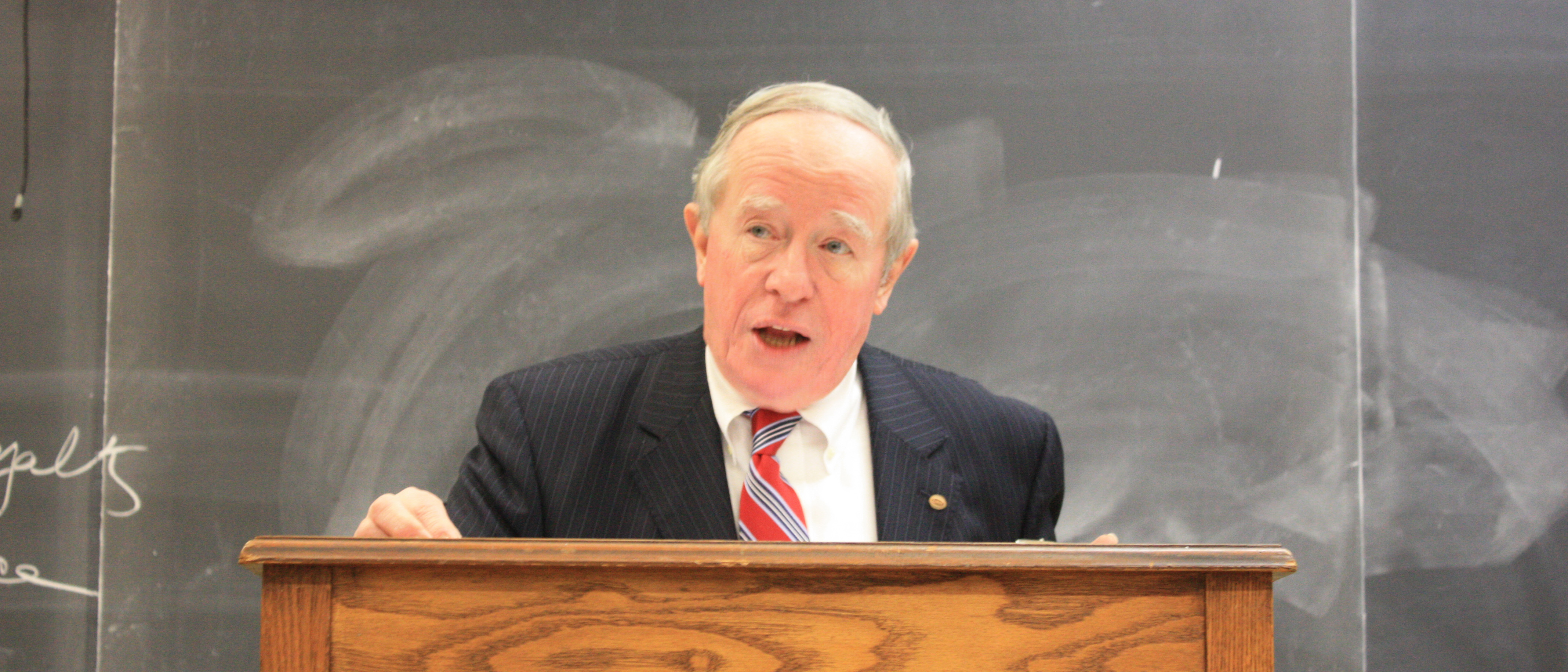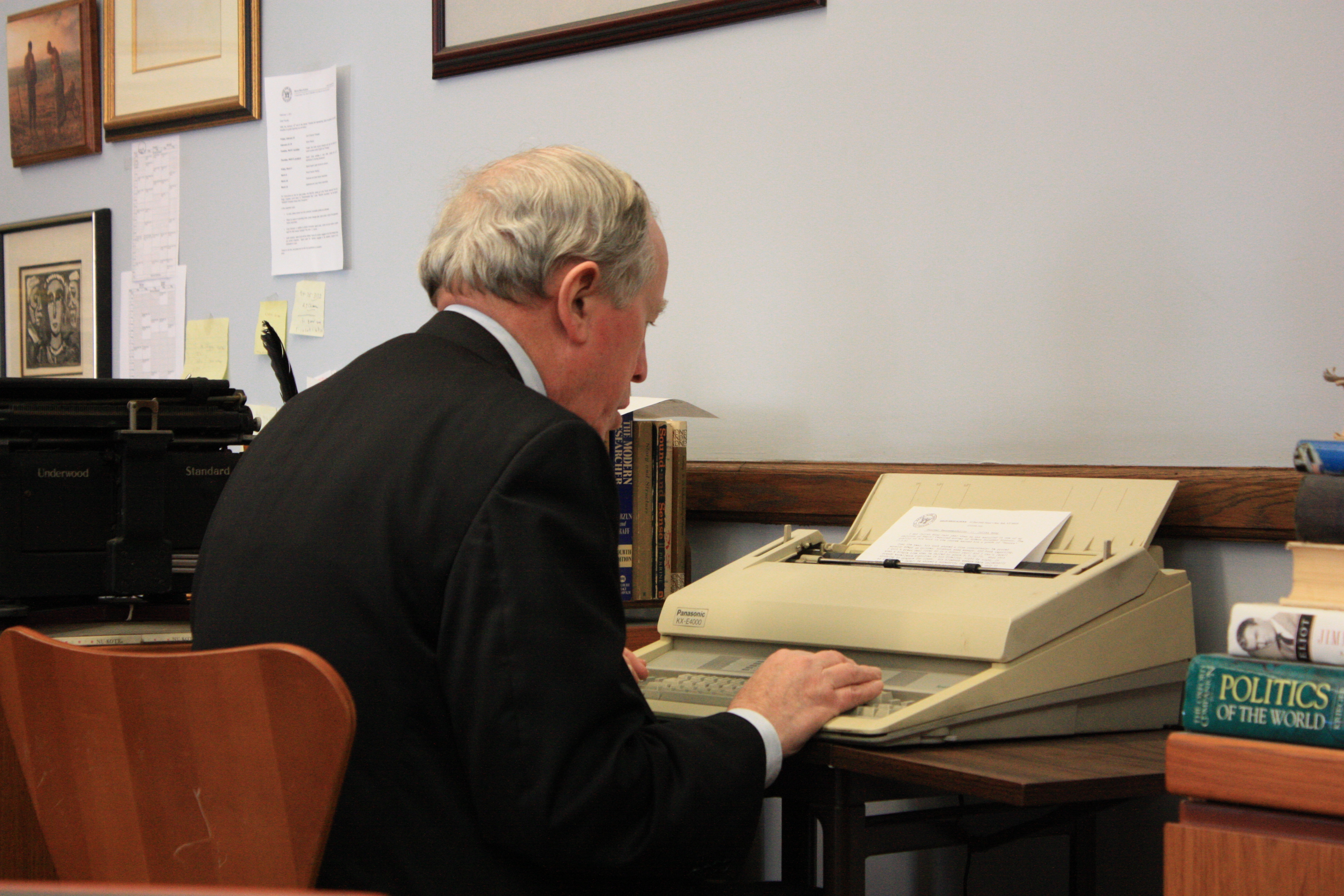In Memoriam: Mr. John Connelly
Mr. John Connelly ’56 P’90’99 passed away on April 16 in Norwalk, Connecticut. Connelly, the longest serving faculty member in school history and a revered icon for generations of alumni, educated Regis students for 52 years. Mr. Connelly first arrived at Regis for his freshman year in the fall of 1952. He earned his undergraduate degree from the College of the Holy Cross and a Master’s degree from Fordham University. In 1981, he was awarded an honorary Doctorate of Humane Letters from Georgetown University. At Regis, Mr. Connelly taught mathematics, European history, economics, classical political thought, and epistemology. His students admired his vast knowledge, his deep faith, and his quick wit. Mr. Connelly was the recipient of the 2015 Deo et Patriae Award, and a scholarship in support of REACH is named in his honor. Mr. Connelly is survived by Susan, his beloved wife of nearly 50 years, and his sons, Jamie ’90 and Michael ’99. The Regis High School community will forever be grateful to Mr. Connelly for the wisdom and friendship he shared.
By Brian FitzGerald ’94
When I began my own career in the classroom, I could have found no better exemplar for how and why to teach than John Connelly. Four years after I graduated from Regis, back at the school as a teacher, I was blessed to become one of John’s colleagues, and over the next decade he became not only a mentor but a friend. At the start, though, I was simply an apprentice fortunate enough to have found an acknowledged master, and I lost no opportunity to learn from him.
In the first month of my very first year, I sat in on a weekly morning reading group which John led, a group whose initiative came from a few students seeking greater understanding of the Catholic intellectual tradition, and of how to unify mind and heart. The young men had been wise enough to discern that Mr. Connelly was the teacher to lead them. The first piece he assigned to the group that year — and indeed at the beginning of every year — was Étienne Gilson’s “The Intelligence in the Service of Christ the King.” No title more apt could be found for John’s own career at Regis.
Re-reading the essay after John’s funeral this spring, I recognized that what he wanted his students to see was also what he himself spent his years at Regis trying to live out: one could indeed — and should indeed — serve Christ with one’s intelligence, but one must do so by first aiming at something else. “Piety never dispenses with technique,” Gilson writes. If you want to serve God with your academic gifts, you must commit yourself to cultivating them. If you want to build a building for the glory of God, you first need to know geometry, and if you want to teach for the glory of God, you must master your craft. To be a good servant of God, John became a great teacher.
Mastering his craft meant for John not just an attention to method but a comprehensive grasp of his subject matter. He was learned in many areas — he began his teaching career as a mathematician, and was revered by his students for his command of philosophy and theology — but his true love was history. In the capaciousness of that subject the entire font of human experience — he found space for the play of his mind.
John told me once that his goal in teaching history was to “diminish ignorance.” This diminishment was not a negative goal: it was instead a great affirmation of Creation, for it meant in reality the opening of eyes to truth, like the polishing of a diamond, and in that exercise John shone.
I do not know at what point in his career John acquired the reputation for being “the smartest teacher at Regis,” but this eminence was well-established by the time I entered as a freshman in 1990. Students with questions on any topic would turn to John for the clarity of an answer or the resolution of a dispute. One of my own classmates tried to stump him with the question that plagued the Reformation — “Mr. Connelly, are we justified by faith or by works?” — and found him ready with an answer that might have saved centuries of upheaval: “We are justified by Jesus Christ.”
John could use his piercing intellect to devastating effect when confronted with mediocre efforts by his students. One written comment of his on an assignment had achieved legendary status among the faculty: a boy discovered at the end of his essay what looked to be the glowing praise of an impressed teacher — “Incredible!” — only to see beneath it a firmly scripted ‘F’.
But John also recognized that Regis students more often than not would rise to the challenge, that indeed the challenge was essential to their education. For years, he ran a special section of his freshman Medieval History course that was essentially “off the books,” not subject to the usual array of lectures and quizzes on textbook readings, but rather something akin to a great-books seminar, where he could assign Boethius, St. Benedict, and Chaucer. What most delighted him was that these fourteen-year-olds would select themselves for this section after he gave the whole class a deliberately exaggerated and foreboding speech at the beginning of term, declaring that the special section would be extremely hard, the most work they had in any course: “And still they signed up!”
The devotion and enthusiasm of such young men gave him hope, gave him the energy to keep teaching. But surely the reverse was also true, that the obvious joy he took in teaching history drew students to him. I once came across him in the Regis foyer mischievously trying to abscond with one of the large ornamental chairs there for a re-enactment of a feudal ceremony with his freshmen.
John was constantly hoping to spark enthusiasm for learning. One of the reasons he taught his famous senior elective Classical Political Thought was simply to introduce young men to Plato, Aristotle, St. Thomas. I know numerous alumni who still possess the texts they bought for that course and who look upon them as their entrance into a lifelong love of wisdom.
In his later years especially, John taught as much by example as by word. Many a young Regian came to cherish him for not being wholly of this time. The typewriter and fountain pen he continued to use, his straw hats and fedoras (with Hapsburg medallion firmly ensconced in one), his vast store of memorized Cole Porter lyrics — these were not mere antiquarian accoutrements. Instead, they revealed him as the representative of another age who, along with his charm, grace, and wit, showed students another way of being in the world, as a Christian gentleman.
He was also an embodiment of Regis’ memory and as such offered glimpses of a tradition stretching back in time. A man who first began teaching when faculty members at the school wore academic robes in the classroom, John was faithful to what he himself had learned there as a schoolboy, and he transmitted many classroom experiences: the outlining of essays before beginning to write exams, the index card to summarize readings, the black-and white marble notebook to be filled with notes on one side of the page only. Till his last days as a teacher, John wore on his lapel the Guard of Honor pin he first put on as a student over 55 years earlier. The Guard itself had been established in 1917 for Regians pledging to attend Mass and receive Communion several times a week. It no longer existed at the school, except in John’s presence for Mass every morning in the chapel. During my time at Regis, John’s was also one of the few classes to begin with a prayer, students on their feet, as had been widely the case in his day.
John’s devotion to his Regis formation was bound up with his commitment to the faith which had been strengthened there by the Jesuits. The constancy of that faith sustained his love for his wife and family and for his Church. It also sustained his work: John’s piety never dispensed with the technique of his craft, but that piety was at the same time the indispensable foundation of his whole life of learning and teaching. Many of John’s students recognized this and turned to him not just for intellectual satisfaction but also for guidance and help in matters of faith. He was a symbol of stability for those in confusion, struggling to find their path to God or trying to understand how to harmonize faith and reason.
One of John’s favorite philosophers, Josef Pieper, once wrote, “love of truth and love of men — only the two together constitute a teacher.” John did love his students, “the lads,” both for who they were and for what they could be. Those who grew closest to him became over the years a part of his life beyond Regis. He was constantly meeting groups of alumni for dinners or attending their weddings or ordinations. He followed the course of their lives with paternal fondness. He also, assuredly, spent numerous evenings on his knees praying for them. He was the fixed center point for a vast network of generations of men who bore his imprint in some way.
Whenever the subject of his potential retirement came up, John would tell me with a laugh that he wanted to pass from this life in a classroom, the chalk in his hand describing half of a perfect parabolic arc down across the blackboard as he fell. (John never lost his early mathematical tendencies.) He recognized how his body was beginning to fail him, how memories were harder to retrieve. But he could think of no conclusion more fitting for a teacher. And almost as soon as he hung up his Regis robes, he found himself back in a classroom, in a small Catholic school near his home in Norwalk, teaching Religion to eighth-graders. He loved it. And was nearly granted his wish.
Unto the very end, he was a teacher ad maiorem Dei gloriam. We shall not look upon his like again.
Brian FitzGerald ’94, the Academic Dean at Magdalen College of the Liberal Arts, taught English and History at Regis from 1998-2008.
Read more Regis news

